|
|
|
Sort Order |
|
|
|
Items / Page
|
|
|
|
|
|
|
| Srl | Item |
| 1 |
ID:
168866
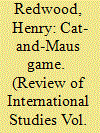

|
|
|
|
|
| Summary/Abstract |
Several scholars have raised concerns that the institutional mechanisms through which transitional justice is commonly promoted in post-conflict societies can alienate affected populations. Practitioners have looked to bridge this gap by developing ‘outreach’ programmes, in some instances commissioning comic books in order to communicate their findings to the people they seek to serve. In this article, we interrogate the ways in which post-conflict comics produce meaning about truth, reconciliation, and the possibilities of peace, focusing in particular on a comic strip published in 2005 as part of the Sierra Leone Truth and Reconciliation Commission Report into the causes and crimes of the 1991–2002 Civil War. Aimed at Sierra Leonean teenagers, the Report tells the story of ‘Sierrarat’, a peaceful nation of rats whose idyllic lifestyle is disrupted by an invasion of cats. Although the Report displays striking formal similarities with Art Spiegelman's Maus (a text also intimately concerned with reconciliation, in its own way), it does so to very different ends. The article brings these two texts into dialogue in order to explore the aesthetic politics of truth and reconciliation, and to ask what role popular visual media like comics can play in their practice and (re)conceptualisation.
|
|
|
|
|
|
|
|
|
|
|
|
|
|
|
|
| 2 |
ID:
168863
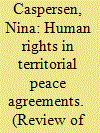

|
|
|
|
|
| Summary/Abstract |
Justice and peace are commonly seen as mutually reinforcing, and key international peacebuilding documents stress the importance of human rights. Is this apparent normative shift reflected in post-Cold War peace agreements? The existing literature is divided on this issue but has crucially treated both conflicts and peace agreements as aggregate categories. This article argues that the conflict type and the agreement's ‘core deal’ impact on the inclusion, or exclusion, of human rights provisions. Based on new coding of the 29 comprehensive agreements signed between 1990 and 2010, it compares agreements signed in territorial and non-territorial conflicts, and agreements with and without territorial autonomy. Qualitative Comparative Analysis is used to examine the different combinations of conditions that led to the inclusion of human rights. The analysis finds that agreements signed in territorial conflicts are significantly less likely to include effective human rights provisions, especially if the settlement includes territorial autonomy. Moreover, such provisions tend to be the result of high levels of international involvement, and the consequent lack of local commitment, or outright resistance, undermines their implementation. These findings point to important trade-offs between group rights and individual rights, and qualifies the notion of a liberal peace.
|
|
|
|
|
|
|
|
|
|
|
|
|
|
|
|
| 3 |
ID:
168867
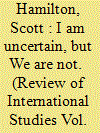

|
|
|
|
|
| Summary/Abstract |
The concept of ‘the Anthropocene’ as a new human-induced geological epoch has made its way into IR. Debates have recently arisen between ‘post-humanists’ stressing its destruction of subject-object binaries and ‘New Anthropocentrists’ arguing that it increases the importance of the human being as planetary steward. This article moves beyond these debates to question a strange but unexplored foundation that underlies the basic discourse of the Anthropocene: the assertion that humanity must be grouped together as a collective species, ‘anthropos’, or planetary ‘We’. Using the philosophy of Martin Heidegger, it argues that the Anthropocene reveals a new and deeper shift in human subjectivity, moving from an individualistic Cartesian ‘I’ to a collective and planetary ‘We’. This argument is made in three steps. First, today's common treatment of humanity as a collective whole in Anthropocene literature is examined. Second, it details how transformations in subjectivity occur by shifting the historical boundaries of our most fundamental notion of certainty – the ‘subiectum’ – and how the technologies of Earth System Science (ESS) subtly facilitate this shift today. Finally, the article argues how this subjective transformation from the ‘I’ to the ‘We’ results from the temporal, spatial, and existential incalculability and uncertainty of the Anthropocene, thereby fostering the rise of certainty in new forms of conflictual identity politics.
|
|
|
|
|
|
|
|
|
|
|
|
|
|
|
|
| 4 |
ID:
168868
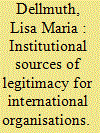

|
|
|
|
|
| Summary/Abstract |
This article addresses a significant gap in the literature on legitimacy in global governance, exploring whether, in what ways, and to what extent institutional qualities of international organisations (IOs) matter for popular legitimacy beliefs towards these bodies. The study assesses the causal significance of procedure and performance as sources of legitimacy, unpacks these dimensions into specific institutional qualities, and offers a comparative analysis across IOs in three issue areas of global governance. Theoretically, the article disaggregates institutional sources of legitimacy to consider democratic, technocratic, and fair qualities of procedure and performance. Empirically, it examines the effects of these institutional qualities through a population-based survey experiment in four countries in different world regions with respect to IOs in economic, security, and climate governance. The findings demonstrate that both procedure- and performance-related aspects of IO policymaking matter for popular legitimacy beliefs. This result holds across democratic, technocratic, and fair qualities of IO procedure and performance. Disaggregating the results by issue area indicates that a broader scope of institutional qualities are important for legitimacy beliefs in economic governance compared to security governance and, especially, climate governance. These findings suggest that propositions to reduce the institutional sources of IO legitimacy to single specific qualities would be misguided.
|
|
|
|
|
|
|
|
|
|
|
|
|
|
|
|
| 5 |
ID:
168865
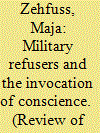

|
|
|
|
|
| Summary/Abstract |
During the Iraq War, some US soldiers refused (re)deployment. While liberal states appear to protect individuals’ right not to fight against their moral convictions by allowing the right to conscientious objection, those whose objections do not align with the regulations have to break the law in order to follow their convictions. This article explores how the legitimation of liberal war is challenged when we listen to the stories such refusers tell. Focusing on the United States, it briefly sets out the normative context such soldiers faced, highlighting the distinction between permissible conscientious objectors and contemptible deserters. Drawing on Judith Butler, it then focuses on two refusers by reading their own accounts of themselves in their memoirs. Despite not being eligible under the regulations, both invoke their conscience to make their refusal intelligible. By listening to their detailed accounts, the article traces the production and disruption of their subjectivities in relation to the prevailing moral order. Although invoking conscience appears to provide the chance to embrace an authentic self in a bid to resist the problematic moral order, subjectivity remains fractured due to relationality. Put differently, the sovereign subjectivity required by liberal war is simultaneously undermined by it.
|
|
|
|
|
|
|
|
|
|
|
|
|
|
|
|
| 6 |
ID:
168869
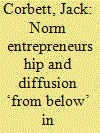

|
|
|
|
|
| Summary/Abstract |
For decades, the world's smallest states – the structurally weakest members of the multilateral system – have been considered incapable of influencing international organisations (IOs). So, why has the label small state risen to prominence over the last two decades and become institutionalised as a formal grouping in multiple IOs? Drawing on more than eighty in-depth interviews, we explain the rise of Small Island Developing States in the United Nations system, the expansion of their agenda to the Small and Vulnerable Economies group at the World Trade Organization, and then to other IOs. The adoption of the labels is evidence of small state norm diffusion. We identify the competent performance of vulnerability within multilateral settings as the key to explaining this norm emergence and diffusion. The lesson is that diffusion ‘from below’ is not always driven by a desire to increase rank. In this case small states have gained benefits by maintaining a lowly position in a hierarchy in which large is stronger than small.
|
|
|
|
|
|
|
|
|
|
|
|
|
|
|
|
| 7 |
ID:
168864
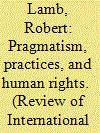

|
|
|
|
|
| Summary/Abstract |
This article is an intervention in recent debates about conceptual and normative theorisations of human rights, which have been increasingly characterised by a divide between ‘moral’ and ‘practice-based’/’political’ understandings. My aim is to articulate an alternative, pragmatist understanding of human rights, one that is importantly distinct from the practice-based account with which it might be thought affiliated. In the first part of the article, I reveal the fundamental flaw in the practice-based account of human rights: I argue that it is undermined by the ontological thesis at its heart, which naturalises and reifies political arrangements and institutions that are radically contingent. In the second part, I identify, and outline the attractiveness of, a pragmatist normative account of human rights. In contrast to the practice-based approach, this pragmatist account construes human rights in ideational terms. The pragmatist understanding accepts both the contingency of our practices and the cultural limits to moral justification, while nevertheless retaining a commitment to the enterprise of normative philosophical conversation. I argue, in contrast to prevailing interpretations, that the international theory advanced by John Rawls exemplifies a pragmatist account of human rights and points a way forward for theoretically fruitful but appropriately circumscribed analysis of the concept.
|
|
|
|
|
|
|
|
|
|
|
|
|
|
|
|
| 8 |
ID:
168871
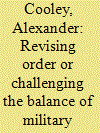

|
|
|
|
|
| Summary/Abstract |
Unimensional accounts of revisionism – those that align states along a single continuum from supporting the status quo to seeking a complete overhaul of the international system – miss important variation between a desire to alter the balance of military power and a desire to alter other elements of international order. We propose a two-dimensional property space that generates four ideal types: status-quo actors, who are satisfied with both order and the distribution of power; reformist actors, who are fine with the current distribution of power but seek to change elements of order; positionalist actors, who see no reason to alter the international order but do aim to shift the distribution of power; and revolutionary actors, who want to overturn both international order and the distribution of capabilities. This framework helps make sense of a number of important debates about hegemony and international order, such as the possibility of revisionist hegemonic powers, controversies over the concept of ‘soft balancing’, and broader dynamics of international goods substitution during power transitions.
|
|
|
|
|
|
|
|
|
|
|
|
|
|
|
|
| 9 |
ID:
168870
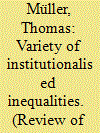

|
|
|
|
|
| Summary/Abstract |
This article argues that the research on institutionalised inequalities pays too little attention to competing understandings of stratification and the variety of interlinkages between the patterns of stratification and the institutions of international society. Building on the English School and theories of stratification, it develops an analytical framework that conceptualises these ‘stratificatory interlinkages’ as a twofold decision: firstly for a coupling – instead of a decoupling – of institutional characteristics to patterns of stratification and secondly for a specific classification scheme and type of interlinkage. The article draws on empirical examples from the League of Nations and other interwar international institutions to demonstrate that different understandings of stratification and classification schemes were used for different institutional purposes, for example, voting rights and the apportionment of budget expenses. In addition, it proposes four analytical dimensions that allow mapping the variety of classification schemes and types of interlinkages that were chosen for institutionalised inequalities. The dimensions relate to the composition of the reference group, the decision-making about the classification scheme, the institutional purposes, and the institutional form of the interlinkage. The variety of stratificatory interlinkages entails a more variable and diverse relation between stratification and institutions than usually assumed.
|
|
|
|
|
|
|
|
|
|
|
|
|
|
|
|
|
|
|
|
|